Four ways Austria has changed after one year of war in Ukraine
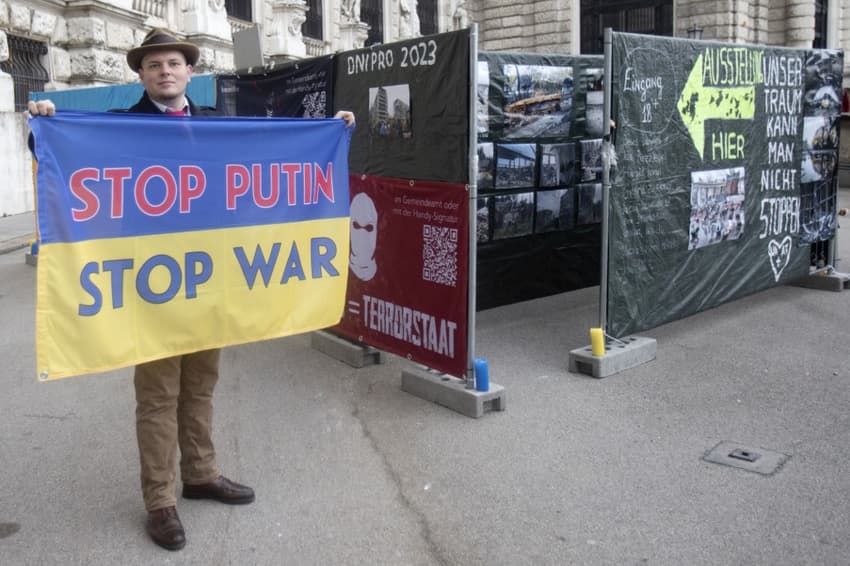
Russia's invasion of Ukraine 12 months ago has left thousands dead and millions displaced. It has also brought consequences for Austria. How has the country changed and what will happen as the invasion continues?
As the Russian war on Ukraine reaches the one-year mark, much has changed in the world - and countries with close ties to Eastern Europe, such as Austria, have been deeply affected.
The conflict has substantially impacted Austrian society, effectively changing the composition of its population as more refugees arrived, domestic politics and economics, and international relations.
The conflict has led to several protests in Austria, with many defending Ukraine's right to independence, whilst some were supporting Russia and urged Austria and western powers not to intervene.
Here are four ways the war in Ukraine has impacted Austria.
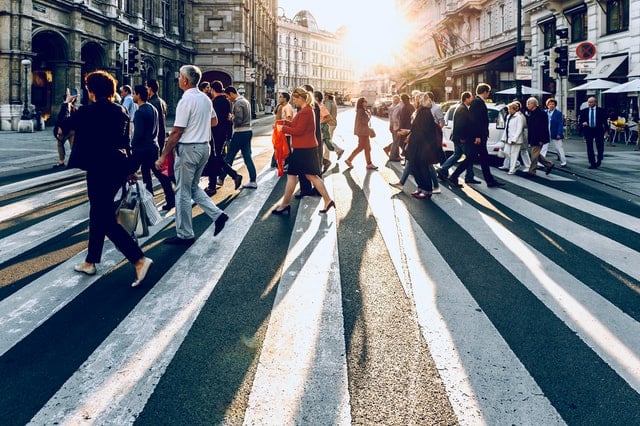
Austria's population growth has started to speed up after a slower rate during the pandemic's first year. Photo: Jacek Dylag/Unsplash
The population increase
Austria's population has, for the first time, passed the nine million mark - primarily because of the war, Statistik Austria, the country's data and information manager, said.
On January 1st, 2023, some 9,106,126 people were living in Austria, a 1.4 percent increase from the beginning of 2022. Thus, Austria recorded a significantly more substantial population increase in 2022 than in the year before (when there was a 0.5 percent increase). Even when compared to 2015, when Europe faced a migration crisis, the numbers weren't so high.
According to Statistik Austria director Tobias Thomas, the reason for the growth is clear: “Austria grew more strongly in 2022 than in previous years. Having already exceeded the nine-million mark in the first quarter of 2022 due to refugee migration from Ukraine, the population was more than 9.1 million at the beginning of 2023. A good half of the population growth in 2022 is attributable to people with Ukrainian citizenship”.
Austria and other EU countries have facilitated the immigration process for Ukraine citizens fleeing the war, offering immediate access to the labour market, German classes and financial support.
It has stirred controversy from the left (with many comparing the treatment of the predominantly white Christian refugees to how war refugees from Syria and Afghanistan are received) and right (with many complaining of "privileges" granted to non-citizens in a time of domestic economic crisis). This division will likely influence Austrian society and politics for years to come.
READ ALSO: Ukrainian refugees push Austria’s population past nine million
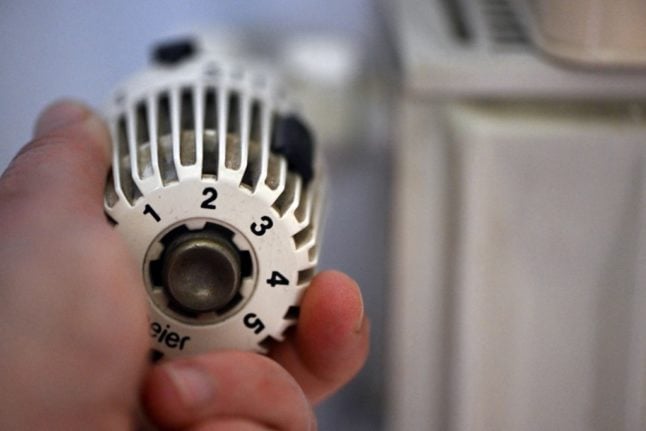
(Photo by Ina FASSBENDER / AFP)
Inflation and energy crisis
Like much of Europe, and the world, the war has affected energy transactions, hit material supplies and brought the cost of living to a historical high. The situation escalated quickly in Austria, a country with strong ties to the east and, especially, to Moscow (80 percent of the gas imported by Austria came from Russia).
Inflation hit double-digit, driven by the significant rise in household energy - despite government measures such as an electricity price brake. As energy prices soared and other raw materials from the east also got pricier, the effects cascaded to almost every sector, from supermarkets to restaurants and hotels.
This has prompted the federal government to act. Regarding energy, Austria has looked to other suppliers as it sought to reduce its dependency on Russian gas. Green movements have also pressured for cleaner, domestic solutions, which take longer to implement. However, with the weight of the war, sanctions on Russia and the Kremlin's "weaponisation" of energy, the first steps have been taken.
As it tried to cushion the effects of inflation, the government also introduced costly measures, including paying €500 directly to the accounts of millions of people living in Austria. However, the economic (and social) costs of such expenses in the medium and long term, especially as the country had just spent billions on the fight to contain the coronavirus pandemic, are still being debated today.
READ ALSO: Energy, corruption, labour shortage: Austria’s plans to face its major challenges
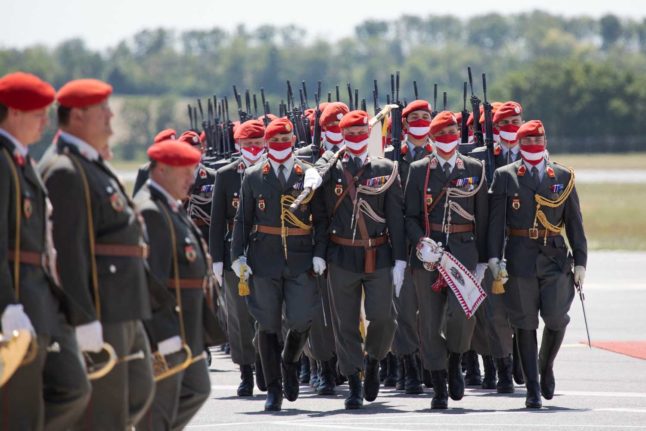
(Photo: ALEX HALADA / AFP)
Military and neutrality
Austria's decades-old (and constitutionally enshrined) neutrality was put to a test as Russia invaded its neighbour. Many were left wondering: what does it mean, really, to be neutral? And should Austria continue to be a neutral country?
On several occasions, chancellor Karl Nehammer (ÖVP) has said that Austria's neutrality is not up for debate. The country finally seems to have reached a new type of neutrality: a military, albeit not a "political" one. Austria has decided to support Ukraine in words and by sending supplies - no arms or tanks, but health assistance.
As a neutral country and not a part of any military alliances such as NATO, Austria has few military excursions, most of which are for peacekeeping purposes, and does not spend much of its budget on its Armed Forces. However, this has changed with the war and the understanding that conventional warcraft is not behind us as once was believed.
The Austrian government announced it would spend €16 billion over the next four years on its military "to make up for shortfalls", according to chancellor Nehammer. Its ageing tank fleet, for example, is receiving €560 million from the budget. While once the threat of terror attacks was one of the main concerns of the Armed Forces, now the ongoing war in Ukraine was now the greatest threat to Austria and Europe.
READ ALSO: What are the biggest threats facing Austria this year?
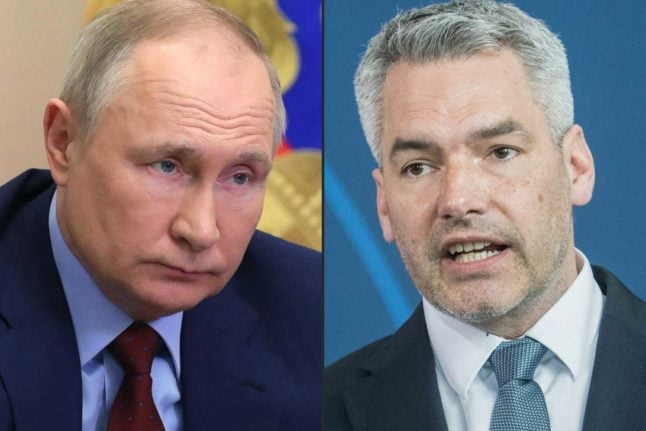
Russian President Vladimir Putin and Austrian Chancellor Karl Nehammer. Photo: Mikhail KLIMENTYEV, Stefanie LOOS / POOL / SPUTNIK / AFP
Diplomacy and Russian relations
The Russian war has forced Austrian politicians to come to terms with the country's long history of close ties with corrupt Russian politics and oligarchs. It had also led to some embarrassing diplomatic moments, with the international community remembering moments such as when the country's Foreign Minister invited and danced with Vladimir Putin at her wedding.
Austrian chancellor Karl Nehammer was also one of the very few western political leaders to meet with Putin after the invasion - and his trip to Moscow was heavily criticised.
The neutral country has also had to deal with other awkward moments. Most recently, it allowed sanctioned Russian delegates to come to Vienna for an OSCE meeting. Austria claimed that it couldn't forbid members from coming to the meeting and acted according to the rules of the organisation headquartered in the capital. Still, the arrival of the Russian delegates led to protests and the Ukrainian representatives boycotting the event.
At the same time, relations with Russia haven't been easy. Nehammer's meeting at the Kremlin, which he said was to ask Putin to stop the war, led to nothing concrete. Recently, Austria, in a rare move, expelled four Russian diplomats, including two accredited with the United Nations in Vienna, saying they had acted " in a manner incompatible with their diplomatic status".
Shortly after, Russia reciprocated, sending four Austrian diplomats home.
Comments
See Also
As the Russian war on Ukraine reaches the one-year mark, much has changed in the world - and countries with close ties to Eastern Europe, such as Austria, have been deeply affected.
The conflict has substantially impacted Austrian society, effectively changing the composition of its population as more refugees arrived, domestic politics and economics, and international relations.
The conflict has led to several protests in Austria, with many defending Ukraine's right to independence, whilst some were supporting Russia and urged Austria and western powers not to intervene.
Here are four ways the war in Ukraine has impacted Austria.

The population increase
Austria's population has, for the first time, passed the nine million mark - primarily because of the war, Statistik Austria, the country's data and information manager, said.
On January 1st, 2023, some 9,106,126 people were living in Austria, a 1.4 percent increase from the beginning of 2022. Thus, Austria recorded a significantly more substantial population increase in 2022 than in the year before (when there was a 0.5 percent increase). Even when compared to 2015, when Europe faced a migration crisis, the numbers weren't so high.
According to Statistik Austria director Tobias Thomas, the reason for the growth is clear: “Austria grew more strongly in 2022 than in previous years. Having already exceeded the nine-million mark in the first quarter of 2022 due to refugee migration from Ukraine, the population was more than 9.1 million at the beginning of 2023. A good half of the population growth in 2022 is attributable to people with Ukrainian citizenship”.
Austria and other EU countries have facilitated the immigration process for Ukraine citizens fleeing the war, offering immediate access to the labour market, German classes and financial support.
It has stirred controversy from the left (with many comparing the treatment of the predominantly white Christian refugees to how war refugees from Syria and Afghanistan are received) and right (with many complaining of "privileges" granted to non-citizens in a time of domestic economic crisis). This division will likely influence Austrian society and politics for years to come.
READ ALSO: Ukrainian refugees push Austria’s population past nine million

Inflation and energy crisis
Like much of Europe, and the world, the war has affected energy transactions, hit material supplies and brought the cost of living to a historical high. The situation escalated quickly in Austria, a country with strong ties to the east and, especially, to Moscow (80 percent of the gas imported by Austria came from Russia).
Inflation hit double-digit, driven by the significant rise in household energy - despite government measures such as an electricity price brake. As energy prices soared and other raw materials from the east also got pricier, the effects cascaded to almost every sector, from supermarkets to restaurants and hotels.
This has prompted the federal government to act. Regarding energy, Austria has looked to other suppliers as it sought to reduce its dependency on Russian gas. Green movements have also pressured for cleaner, domestic solutions, which take longer to implement. However, with the weight of the war, sanctions on Russia and the Kremlin's "weaponisation" of energy, the first steps have been taken.
As it tried to cushion the effects of inflation, the government also introduced costly measures, including paying €500 directly to the accounts of millions of people living in Austria. However, the economic (and social) costs of such expenses in the medium and long term, especially as the country had just spent billions on the fight to contain the coronavirus pandemic, are still being debated today.
READ ALSO: Energy, corruption, labour shortage: Austria’s plans to face its major challenges

Military and neutrality
Austria's decades-old (and constitutionally enshrined) neutrality was put to a test as Russia invaded its neighbour. Many were left wondering: what does it mean, really, to be neutral? And should Austria continue to be a neutral country?
On several occasions, chancellor Karl Nehammer (ÖVP) has said that Austria's neutrality is not up for debate. The country finally seems to have reached a new type of neutrality: a military, albeit not a "political" one. Austria has decided to support Ukraine in words and by sending supplies - no arms or tanks, but health assistance.
As a neutral country and not a part of any military alliances such as NATO, Austria has few military excursions, most of which are for peacekeeping purposes, and does not spend much of its budget on its Armed Forces. However, this has changed with the war and the understanding that conventional warcraft is not behind us as once was believed.
The Austrian government announced it would spend €16 billion over the next four years on its military "to make up for shortfalls", according to chancellor Nehammer. Its ageing tank fleet, for example, is receiving €560 million from the budget. While once the threat of terror attacks was one of the main concerns of the Armed Forces, now the ongoing war in Ukraine was now the greatest threat to Austria and Europe.
READ ALSO: What are the biggest threats facing Austria this year?

Diplomacy and Russian relations
The Russian war has forced Austrian politicians to come to terms with the country's long history of close ties with corrupt Russian politics and oligarchs. It had also led to some embarrassing diplomatic moments, with the international community remembering moments such as when the country's Foreign Minister invited and danced with Vladimir Putin at her wedding.
Austrian chancellor Karl Nehammer was also one of the very few western political leaders to meet with Putin after the invasion - and his trip to Moscow was heavily criticised.
The neutral country has also had to deal with other awkward moments. Most recently, it allowed sanctioned Russian delegates to come to Vienna for an OSCE meeting. Austria claimed that it couldn't forbid members from coming to the meeting and acted according to the rules of the organisation headquartered in the capital. Still, the arrival of the Russian delegates led to protests and the Ukrainian representatives boycotting the event.
At the same time, relations with Russia haven't been easy. Nehammer's meeting at the Kremlin, which he said was to ask Putin to stop the war, led to nothing concrete. Recently, Austria, in a rare move, expelled four Russian diplomats, including two accredited with the United Nations in Vienna, saying they had acted " in a manner incompatible with their diplomatic status".
Shortly after, Russia reciprocated, sending four Austrian diplomats home.
Join the conversation in our comments section below. Share your own views and experience and if you have a question or suggestion for our journalists then email us at [email protected].
Please keep comments civil, constructive and on topic – and make sure to read our terms of use before getting involved.
Please log in here to leave a comment.